#vladimir lenin
Text

Рассвет | The Dawn;
Anatoly Levitin, 1975.
131 notes
·
View notes
Text

#socialism#communism#marxism#politics#us politics#anti capitalism#two party system#democrats#republicans#uk politics#conservative party#labour party#Lenin#Vladimir Lenin
1K notes
·
View notes
Text

November 7th marks the anniversary of the october revolution which resulted in the hardest painting ever made
5K notes
·
View notes
Text
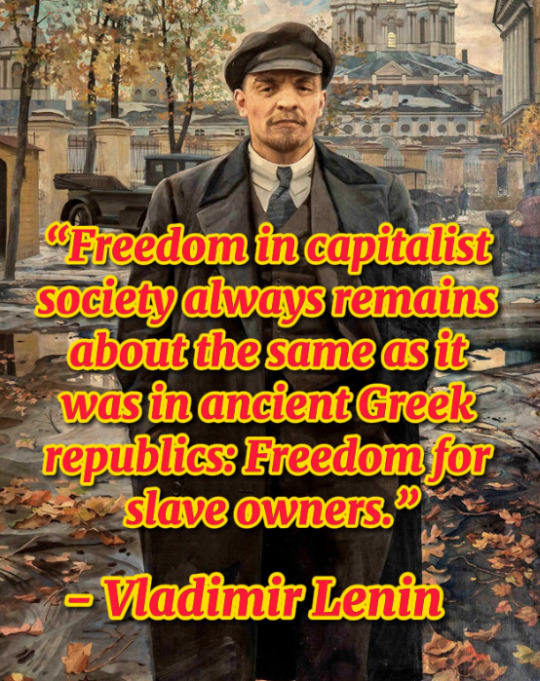
Bam Bam Bam
584 notes
·
View notes
Text
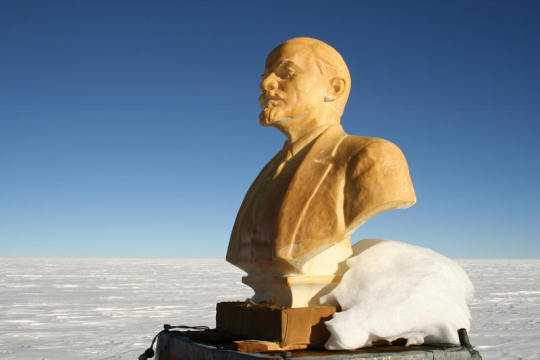
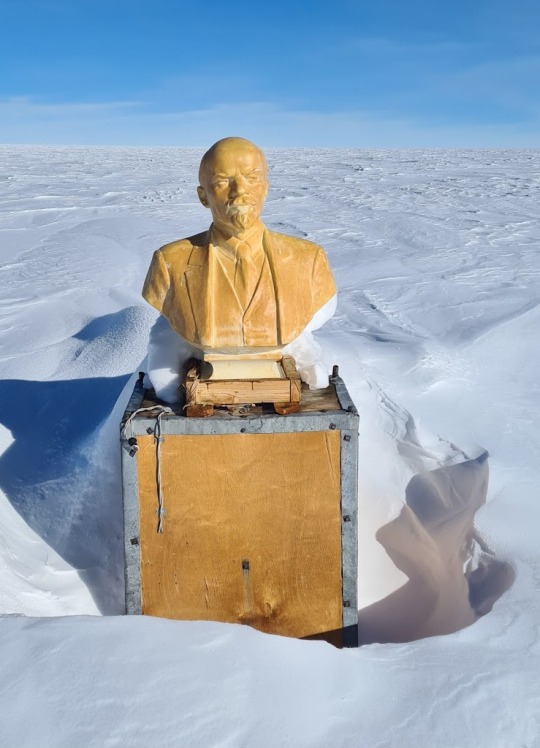
Statue of Lenin at the Pole of Inaccessibility research station, Antarctica. Map
378 notes
·
View notes
Text

#leftism#anti capitalism#socialism#communism#anarchy#anarchism#leftist#anarchocommunism#karl marx#marxism#vladimir lenin#marxism leninism
206 notes
·
View notes
Text

#marxism leninism#queer#lgbtqia#lgbtq community#lesbian#nonbinary#sapphic#lgbt pride#nonbinary lesbian#gay girls#lgbtq#marxist leninist#vladimir lenin#leningrad#socialism#marxism#communism#lenin#karl marx#working class#eat the rich#tax the rich#wage theft#workers rights#unionize
346 notes
·
View notes
Text
Remember, remember the 7th of November when the sky was assaulted and the tsarist eagle was brought low by the might of the people!
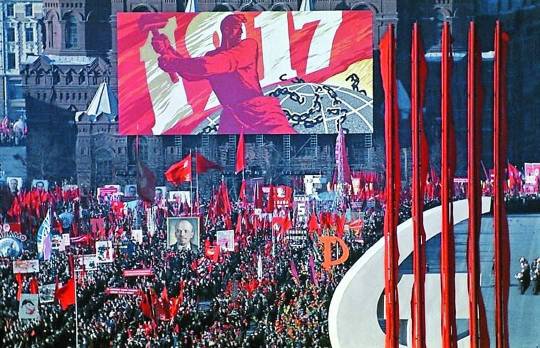
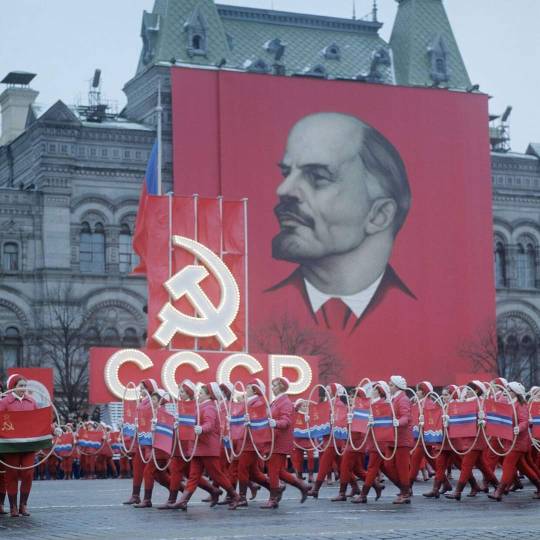
#socialismo#socialism#socialist#communism#marxism leninism#marxist leninist#marxist#marxismo#marxism#october revolution#vladimir lenin#lenin
255 notes
·
View notes
Text
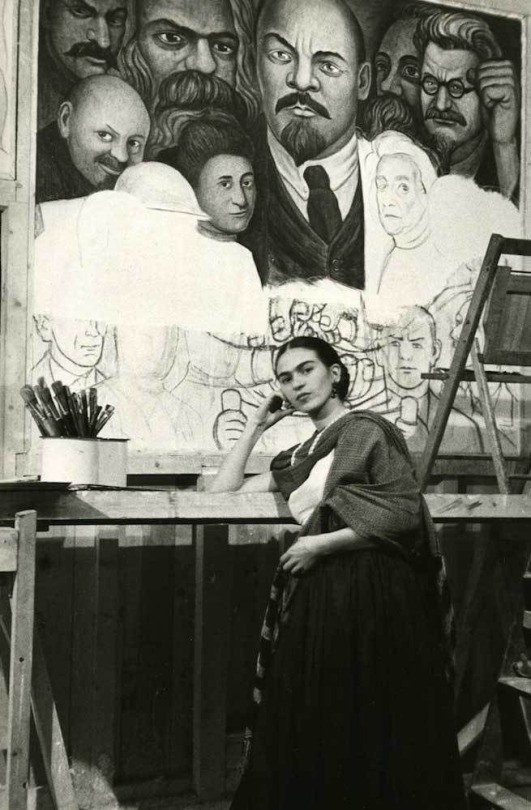
Frida Kahlo
656 notes
·
View notes
Text
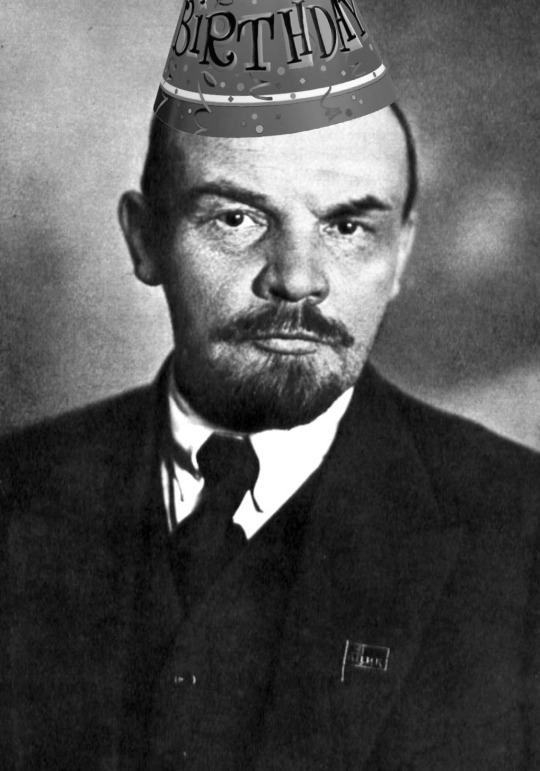
Happy birthday, Vladimir Lenin! (April 22, 1870)
One of the most relevant and influential revolutionary figures of the 20th century, Vladimir Lenin, birth name Vladimir Ilyich Ulyanov, was born in Simbirsk to a well-off family. Lenin's brother was himself a revolutionary, and his execution in 1887 for the attempted assassination of Tsar Alexander III spurred Lenin to embrace revolutionary socialist politics. He was eventually sent into internal exile in Siberia for his activities, before relocating to Western Europe. Lenin became a prominent figure in the Russian Social Democratic Party, and led the Bolshevik faction in the party's split, opposing the Menshiviks. During World War I, Lenin articulated the position of the international socialist movement's left wing, arguing that socialists should oppose their imperialist governments in wartime and work to convert the imperialist war into a war to enact the overthrow of capitalism. After the Tsar was overthrown in the February Revolution, Lenin returned to lead the Bolsheviks in Russia, and they soon seized state power in the October Revolution. The Social Democratic Party was soon reformed into the Communist Party, and Lenin led the new Russian Soviet Federative Socialist Republic in withdrawing from the world war, defeating the right-wing Whites in the Russian Civil War, and establishing the Soviet Union. Lenin also founded the Communist International in order for the international socialist movement to coordinate strategically. In the aftermath of the civil war, Lenin promulgated the New Economic Policy, which was intended to help the Soviet Union rebuild and develop its productive forces. Lenin died soon after the end of the civil war in 1924, and was ultimately succeeded as leader of the Soviet Union by Joseph Stalin. Lenin's developments to Marxist theory are known as Leninism, and his most prominent works include What is to be Done?, The State and Revolution, and Imperialism: The Highest Stage of Capitalism.
"The dictatorship of the proletariat, i.e., the organization of the vanguard of the oppressed as the ruling class for the purpose of suppressing the oppressors, cannot result merely in an expansion of democracy. Simultaneously with an immense expansion of democracy, which for the first time becomes democracy for the poor, democracy for the people, and not democracy for the money-bags, the dictatorship of the proletariat imposes a series of restrictions on the freedom of the oppressors, the exploiters, the capitalists."
658 notes
·
View notes
Text
“The feminine section of the proletarian army is of particularly great significance. The success of a revolution depends on the extent to which women take part of it„
-Vladimir Lenin

255 notes
·
View notes
Text
But from this capitalist democracy--that is inevitably narrow and stealthily pushes aside the poor, and is therefore hypocritical and false through and through--forward development does not proceed simply, directly and smoothly, towards "greater and greater democracy", as the liberal professors and petty-bourgeois opportunists would have us believe. No, forward development, i.e., development towards communism, proceeds through the dictatorship of the proletariat, and cannot do otherwise, for the resistance of the capitalist exploiters cannot be broken by anyone else or in any other way.
And the dictatorship of the proletariat, i.e., the organization of the vanguard of the oppressed as the ruling class for the purpose of suppressing the oppressors, cannot result merely in an expansion of democracy. Simultaneously with an immense expansion of democracy, which for the first time becomes democracy for the poor, democracy for the people, and not democracy for the money-bags, the dictatorship of the proletariat imposes a series of restrictions on the freedom of the oppressors, the exploiters, the capitalists. We must suppress them in order to free humanity from wage slavery, their resistance must be crushed by force; it is clear that there is no freedom and no democracy where there is suppression and where there is violence.
Engels expressed this splendidly in his letter to Bebel when he said, as the reader will remember, that "the proletariat needs the state, not in the interests of freedom but in order to hold down its adversaries, and as soon as it becomes possible to speak of freedom the state as such ceases to exist".
Democracy for the vast majority of the people, and suppression by force, i.e., exclusion from democracy, of the exploiters and oppressors of the people--this is the change democracy undergoes during the transition from capitalism to communism.
Only in communist society, when the resistance of the capitalists have disappeared, when there are no classes (i.e., when there is no distinction between the members of society as regards their relation to the social means of production), only then "the state... ceases to exist", and "it becomes possible to speak of freedom". Only then will a truly complete democracy become possible and be realized, a democracy without any exceptions whatever. And only then will democracy begin to wither away, owing to the simple fact that, freed from capitalist slavery, from the untold horrors, savagery, absurdities, and infamies of capitalist exploitation, people will gradually become accustomed to observing the elementary rules of social intercourse that have been known for centuries and repeated for thousands of years in all copy-book maxims. They will become accustomed to observing them without force, without coercion, without subordination, without the special apparatus for coercion called the state.
-Vladimir Lenin, The State and Revolution
57 notes
·
View notes
Text
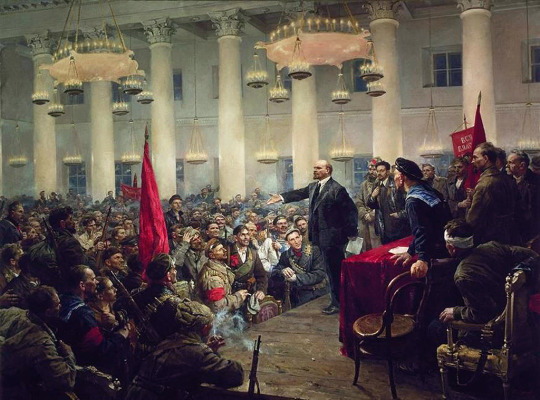
Valentin Serov | Lenin proclaims the victory of the revolution at the Second All-Russian Congress of Soviets.
#Valentin Serov#Russian Art#Vladimir Lenin#Lenin#Russian Revolution#the russian revolution#soviet history#Art
78 notes
·
View notes
Text

#anti capitalism#communism#anarchy#twitter post#tweet#twitter x#rip twitter#leftism#socialism#xitter#communist#anarchism#marxism#marxism leninism#marxist leninist#marx kirby#karl marx#lenin#vladimir lenin#leningrad#russian history#russian#canada#far right#gun violence#conservatism#genocide#hate crimes
292 notes
·
View notes
Text
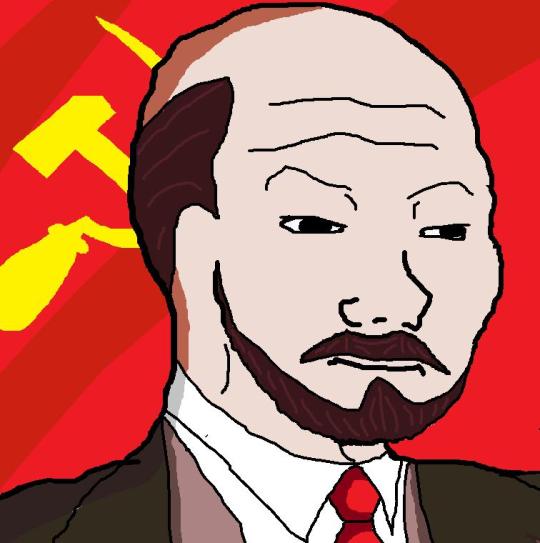
Title/Name: Vladimir Ilyich Ulyanov, better known as 'Vladimir Lenin' or simply 'Lenin', (1870–1924).
Bio: Russian revolutionary, politician, and political theorist. He served as the first and founding head of government of Soviet Russia from 1917 until his death in 1924, and of the Soviet Union from 1922 to 1924. He became an ideological figurehead behind Marxism–Leninism and a prominent influence over the international communist movement.
Country: Russia
Wojak Series: Feels Guy (Variant)
Image by: Unknown
Main Tag: Lenin Wojak
#Wojak#Lenin#Lenin Wojak#Vladimir Lenin#Vladimir Lenin Wojak#Feels Guy#Feels Guy Wojak#Feels Guy Series#Politics#White#Red#Yellow#Brown#Wojak With Background#Writer Author
37 notes
·
View notes
Text
“It has always been the case in history that after the death of revolutionary leaders who were popular among the oppressed classes, their enemies have attempted to appropriate their names so as to deceive the oppressed classes.”
— Lenin
#lenin#vladimir lenin#lenin: imperialism and the split in socialism#liberation#quote#marxism leninism#marxism#communism#socialism#revolutionaries
232 notes
·
View notes